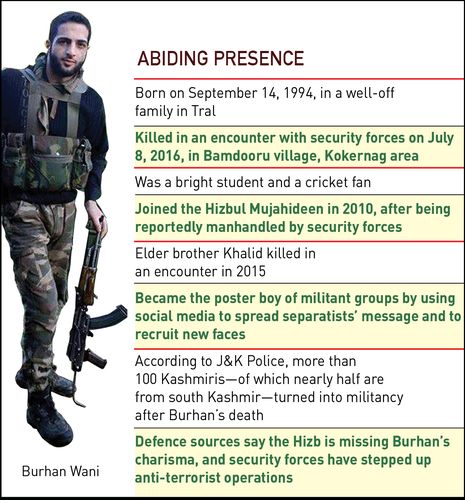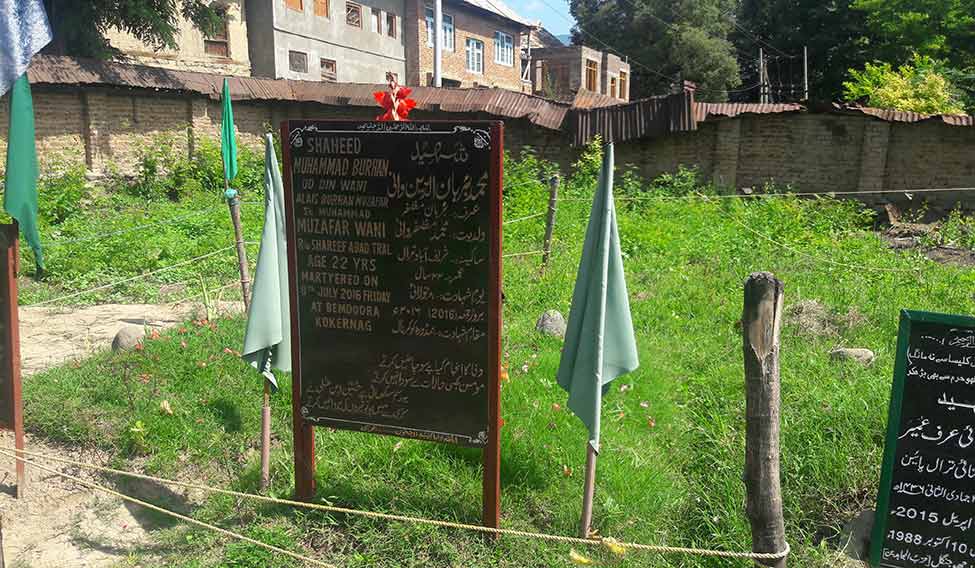After killing Osama Bin Laden in a daring raid on his safe house in Pakistan, American commandos dumped his body in the sea. The Americans were sure that if the Al Qaeda chief were buried on land, the grave would become a shrine for jihadis world over. What the Americans feared about Osama is turning out to be true in the case of the slain Hizbul Mujahideen commander Burhan Muzaffar Wani. He was killed in an encounter with security forces on July 8, 2016, at Bamdooru village in Kokernag, south Kashmir. A year later, people from his hometown, Tral, and other parts of Kashmir have started visiting his grave in the village of Sharifabad for prayers and blessings.
Burhan is buried next to his brother Khalid, who, too, died in an encounter with security forces three years ago. Burhan’s tombstone has his name, the names of his parents, his place of birth and the date of his death. The grave is marked by a rope and a few flags in green and light blue. There is nothing ostentatious about the grave, like the mausoleums of some revered preachers and mystics. And, groups like the Lashkar-e-Taiba do not approve of the saint-like status being accorded to Burhan. Yet, people, mostly men, flock to the place to offer ritual prayers. They leave with a handful of soil, hoping for blessings, healing and even better harvest. Some visit the grave on their wedding day.
Ghulam Nabi Mir, a 65-year-old farmer, said his crops grew much better after he sprinkled soil from Burhan’s grave on his field. “It is no less a shrine for us. Here, I still have some soil from his grave in my pocket,” he said, patting his shirt pocket. “People come to Burhan’s grave and leave after picking a fistful of soil,’’ said Abdul Hafiz (name changed), from Sharifabad. He was reluctant to talk freely for the fear of being interrogated by the Army. The security establishment is worried that the growing popularity of Burhan’s tomb will reinforce the cult of martyrdom that is fuelling militancy in south Kashmir.
Two days before the first anniversary of Burhan’s death, soldiers from the Rashtriya Rifles (RR) were seen frisking visitors to the grave. As the separatists had urged people to assemble at Tral for the death anniversary, even those who were passing through the area were subjected to stringent checking. The government suspended internet access across Kashmir and deployed a large contingent of security personnel in Tral. Security was also reinforced in other parts of the state, including Srinagar, Pulwama, Anantnag, Kulgam and Shopian. A few attempts to take out rallies on July 8 were quickly quashed. Tral, which was sealed off, remained largely peaceful.
I managed to reach Tral on July 6, two days before Burhan’s death anniversary. The tension was palpable; most shops were shut. Pedestrian and vehicular movements were thin. A mine protected vehicle was parked outside the graveyard. Although a group of RR men stood guard nearby, I managed to enter the graveyard. When I came out, an RR officer took my mobile phone to check for photos. Another reporter was asked to prove his identity, and when he showed his ID card to the officer, he asked his junior to click a photo of it for verification.

Many boys in Sharifabad, who refused to reveal their names, said the police had asked them to bring their motorbikes to the police station. Most of them complied with the order. “The police suspected that we would take out a bike rally on July 8,’’ said a college student.
Burhan’s father, Muzaffar Wani, who works as a school principal, was summoned by the police to ask about the number of people planning to come for the death anniversary. “I told them I had no idea,’’ he said. “The government mishandled the situation last year when people came to mourn the death of my son.’’ He said after Burhan’s death, people from all over Kashmir and outside had come to meet the family. “The rush has ebbed, but not ended.”
“I told the police that I had not planned anything on Burhan’s death anniversary, but if some people came to meet us, I will offer them a glass of water, at least,’’ said Muzaffar. “I cannot stop people from expressing their condolences. They come from all over Kashmir, including Jammu.’’ As we were talking, a group of students dropped in to meet him. “They come to meet me out of respect and love for being Burhan’s father,’’ he said.
The students sat on the chairs kept for the visitors in the lawn. Each one of them hugged Muzaffar. After talking to the students for some time, he said, “This has been routine since last July.’’
What has changed after Burhan’s death? “With two of my sons martyred, I have nothing to fear. The third one is attending college,’’ he said. Do people at the school ask questions? “I don’t allow any kind of political discussions or activities about Kashmir in the school,’’ he said.
What does he think about people visiting Burhan’s grave for help? “I know people visit his grave, but I don’t approve of it,’’ he said. “The bloodshed in Kashmir will end if Kashmiris, India and Pakistan show flexibility and talk to each other sincerely to resolve this issue. India has to be sincere in its dealings with Kashmiris.’’







